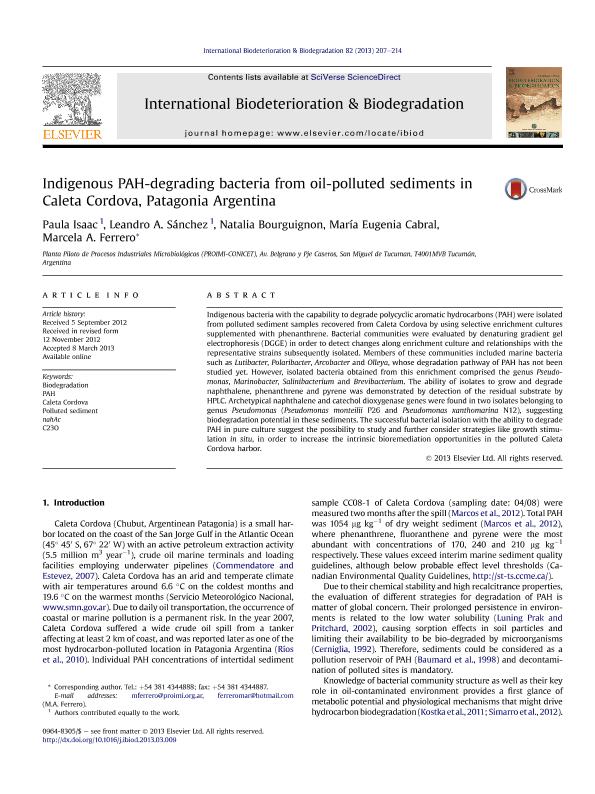Artículo
Indigenous PAH-Degrading Bacteria from oil-polluted sediments in Caleta Cordova, Patagonia Argentina
Isaac, Paula ; Sanchez, Leandro Arturo
; Sanchez, Leandro Arturo ; Bourguignon, Natalia
; Bourguignon, Natalia ; Cabral, Maria Eugenia
; Cabral, Maria Eugenia ; Ferrero, Marcela Alejandra
; Ferrero, Marcela Alejandra
 ; Sanchez, Leandro Arturo
; Sanchez, Leandro Arturo ; Bourguignon, Natalia
; Bourguignon, Natalia ; Cabral, Maria Eugenia
; Cabral, Maria Eugenia ; Ferrero, Marcela Alejandra
; Ferrero, Marcela Alejandra
Fecha de publicación:
04/2013
Editorial:
Elsevier
Revista:
International Biodeterioration and Biodegradation
ISSN:
0964-8305
Idioma:
Inglés
Tipo de recurso:
Artículo publicado
Clasificación temática:
Resumen
Indigenous bacteria with the capability to degrade polycyclic aromatic hydrocarbons (PAH) were isolated from polluted sediment samples recovered from Caleta Cordova by using selective enrichment cultures supplemented with phenanthrene. Bacterial communities were evaluated by denaturing gradient gel electrophoresis (DGGE) in order to detect changes along enrichment culture and relationships with the representative strains subsequently isolated. Members of these communities included marine bacteria such as Lutibacter, Polaribacter, Arcobacter and Olleya, whose degradation pathway of PAH has not been studied yet. However, isolated bacteria obtained from this enrichment comprised the genus Pseudomonas, Marinobacter, Salinibacterium and Brevibacterium. The ability of isolates to grow and degrade naphthalene, phenanthrene and pyrene was demonstrated by detection of the residual substrate by HPLC. Archetypical naphthalene and catechol dioxygenase genes were found in two isolates belonging to genus Pseudomonas (P. monteilii P26 and P. xanthomarina N12), suggesting biodegradation potential in these sediments. The successful bacterial isolation with the ability to degrade PAH in pure culture suggest the possibility to study and further consider strategies like growth stimulation in situ, in order to increase the intrinsic bioremediation opportunities in the polluted Caleta Cordova harbor.
Palabras clave:
BIODEGRADATION
,
C23O
,
CALETA CORDOVA
,
NAHAC
,
PAH
,
POLLUTED SEDIMENT
Archivos asociados
Licencia
Identificadores
Colecciones
Articulos(PROIMI)
Articulos de PLANTA PILOTO DE PROC.IND.MICROBIOLOGICOS (I)
Articulos de PLANTA PILOTO DE PROC.IND.MICROBIOLOGICOS (I)
Citación
Isaac, Paula; Sanchez, Leandro Arturo; Bourguignon, Natalia; Cabral, Maria Eugenia; Ferrero, Marcela Alejandra; Indigenous PAH-Degrading Bacteria from oil-polluted sediments in Caleta Cordova, Patagonia Argentina; Elsevier; International Biodeterioration and Biodegradation; 82; 4-2013; 207-214
Compartir
Altmétricas



